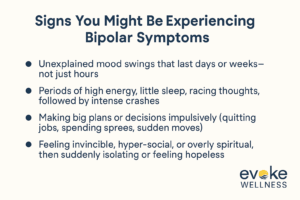You’ve been holding a lot. Maybe no one else knows how much. Some days you’re firing on all cylinders—hardly sleeping, full of ideas, suddenly making big decisions that even you can’t fully explain. Other days, just getting out of bed feels like dragging your body through quicksand.
You might chalk it up to stress. Or hormones. Or just being “extra.” And maybe it is.
But sometimes… it isn’t.
If you’ve ever caught yourself wondering—Is this normal? Or is something deeper going on?—this blog is for you. As someone who’s been in that uncertain space myself, I want to share some answers, not to diagnose you, but to offer clarity, calm, and maybe a little hope.
Let’s walk through some of the most common questions people ask when they’re trying to figure out what’s happening inside their minds.
What’s the difference between being stressed and having bipolar disorder?
Everyone experiences emotional ups and downs. Life gets messy—grief, breakups, burnout, money pressure, family stuff. Stress can push anyone to their edge. So how do you tell the difference?
The key difference is how much your mood shifts, how long it lasts, and how disconnected it feels from what’s actually happening around you.
Here’s what that might look like:
- Stress: You’re overwhelmed, but your emotions generally match the situation. If the stressor goes away, your energy and mood return to baseline.
- Bipolar disorder: Your mood and energy may swing dramatically even when life is steady—or swing in ways that feel “too big” for what’s going on.
You might find yourself feeling euphoric or unstoppable, sleeping only 2–3 hours, speaking quickly, jumping between projects… then weeks later, you’re flatlined, unable to feel joy, disconnected from people you love.
That isn’t just “life.” That’s a cycle. And it’s treatable.
Could my trauma or burnout explain all this?
Absolutely. Many people with bipolar disorder also have histories of trauma, chronic stress, or anxiety. And the symptoms can overlap.
You may have learned to operate in survival mode for so long that mood swings feel like your default. But here’s the difference: trauma responses are often triggered by specific reminders, while bipolar shifts tend to come and go with their own internal rhythm.
And here’s the most important part: you don’t need a clean answer before asking for help. Whether it’s trauma, burnout, bipolar disorder, or a mix—you still deserve support.
How can I tell if I’m experiencing signs of bipolar disorder?
There’s no single test or checklist that can confirm a diagnosis—but here are some signs that often show up in people with undiagnosed bipolar disorder:
Signs You Might Be Experiencing Bipolar Symptoms:
- Unexplained mood swings that last days or weeks—not just hours
- Periods of high energy, little sleep, racing thoughts, followed by intense crashes
- Making big plans or decisions impulsively (quitting jobs, spending sprees, sudden moves)
- Feeling invincible, hyper-social, or overly spiritual, then suddenly isolating or feeling hopeless
- Friends or loved ones have said something feels “off” or asked if you’re okay
If you’ve ever wondered, Why am I either all in or completely checked out?—you’re not imagining it. And it’s okay to ask questions about your mind.
What if I’m scared to be diagnosed—or afraid of being put on meds?
This one hits close to home.
I remember when someone first said the word “bipolar” out loud about me. I shut down. I didn’t want to be “that person.” I didn’t want meds. I didn’t want to feel like I’d be changed forever.
Here’s what I’ve learned: a diagnosis doesn’t define you—it gives you a language. It opens the door to support that’s actually aligned with what’s going on. And medications? They’re tools. You don’t have to say yes to anything you’re not ready for.
At Evoke Wellness Ohio, the approach is collaborative. That means you’re part of the conversation. If medication feels scary, you can go slow. Ask questions. Understand side effects. Talk through alternatives. No pressure. No decisions made for you.
Getting support doesn’t mean giving up who you are. It means getting more access to your voice, your stability, and your peace.
When is it time to reach out for help?
If you’re asking the question, you probably already know.
You don’t have to wait for a full-blown crisis. You don’t have to prove your suffering. You don’t have to wait until everything is falling apart.
Here are some gentle signs it might be time:
- You’ve googled “bipolar disorder” more than once and felt something click
- You can’t seem to stay balanced emotionally—even when things are going “okay” externally
- People around you are concerned or confused by your behavior
- You’re tired of managing this silently, without answers
It doesn’t have to stay this hard. In Columbus, Ohio, Evoke Wellness offers bipolar disorder treatment that meets you where you are—whether you’re curious, skeptical, or ready to begin.
Real Talk: You Are Not “Too Much” for Needing Support
If your emotions feel like they don’t fit into neat little boxes, you are not broken.
So many of us live for years thinking, I just need to get it together, or I’m just dramatic, or Everyone goes through stuff. But when your highs feel like rocket fuel and your lows feel like you’re buried alive—that’s not just stress. That’s worth getting looked at.
And it’s okay to want clarity without shame.
“I finally asked for help when I realized I wasn’t lazy, I was exhausted from cycling between extremes. Getting diagnosed didn’t fix everything—but it gave me a place to start.”
– Peer in treatment
You Deserve Clarity—and Care That Fits You
You don’t have to figure it all out before you reach out. You just have to be willing to take one small step toward something steadier.
If something in this blog resonated, or if you’re just tired of feeling emotionally hijacked by your own brain, we’re here to help.
Call Evoke Wellness Ohio at (866) 430-9267 to talk through options—no pressure, no judgment. Or explore our bipolar disorder treatment program in Columbus, OH to learn more about how we support people just like you.



